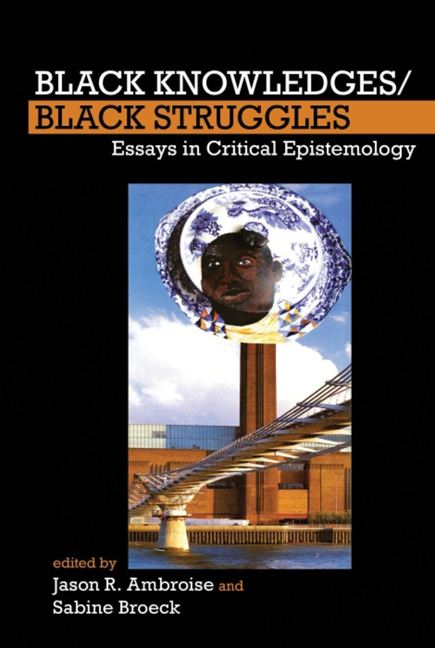Book contents
- Frontmatter
- Contents
- List of Figures
- List of Contributors
- 1 Black Knowledges/Black Struggles: An Introduction
- 2 “Come on Kid, Let's Go Get the Thing”: The Sociogenic Principle and the Being of Being Black/Human
- 3 Respectability and Representation: Black Freemasonry, Race, and Early Free Black Leadership
- 4 Ethno-Class Man and the Inscription of “the Criminal”: On the Formation of Criminology in the USA
- 5 Dehumanization, the Symbolic Gaze, and the Production of Biomedical Knowledge
- 6 Performing Scientificity: Race, Science, and Politics in the USA and Germany after the Second World War
- 7 Imaginary Black Topographies: What are Monuments For?
- 8 The Ceremony Found: Towards the Autopoetic Turn/Overturn, its Autonomy of Human Agency and Extraterritoriality of (Self-)Cognition
- Works Cited
- Index
3 - Respectability and Representation: Black Freemasonry, Race, and Early Free Black Leadership
- Frontmatter
- Contents
- List of Figures
- List of Contributors
- 1 Black Knowledges/Black Struggles: An Introduction
- 2 “Come on Kid, Let's Go Get the Thing”: The Sociogenic Principle and the Being of Being Black/Human
- 3 Respectability and Representation: Black Freemasonry, Race, and Early Free Black Leadership
- 4 Ethno-Class Man and the Inscription of “the Criminal”: On the Formation of Criminology in the USA
- 5 Dehumanization, the Symbolic Gaze, and the Production of Biomedical Knowledge
- 6 Performing Scientificity: Race, Science, and Politics in the USA and Germany after the Second World War
- 7 Imaginary Black Topographies: What are Monuments For?
- 8 The Ceremony Found: Towards the Autopoetic Turn/Overturn, its Autonomy of Human Agency and Extraterritoriality of (Self-)Cognition
- Works Cited
- Index
Summary
In 1787, African Lodge No. 459, the first Black lodge, received a charter from the English Grand Lodge in London. This group of African American Freemasons first organized in 1775 and obtained a prior provisional warrant from an American lodge that did not grant them the authority to raise new members. The charter of 1787 confirmed that the English Grand Lodge in London had entered the Black Bostonians on their list of all official lodges. Working to legitimate the Black lodge, its organizer, Prince Hall, maintained a regular correspondence with the English authorities that included sending the “General Regulations of the African Lodge” and drafts of public addresses illustrating the role of Africans and their descendants in the Masonic tradition. Hall printed three public speeches in 1789, 1792, and 1797 that comprise the extant record of early Black Masonic thought. John Marrant, the itinerant Methodist preacher who joined African Lodge after arriving to Boston, crafted and preached the first charge and Hall wrote and presented the second and third addresses. Just before Hall gave his 1792 presentation, he gave a speech, perhaps the same one, to the Reverend William Bentley, from Salem, Massachusetts, a white Freemason esteemed for his knowledge of Masonic ritual. Hall also sent copies of his 1792 charge to the king of England, the prince of Wales, and to the English Grand Lodge (Brooks, 2003: 137). Appraising the work of Hall, Bentley commented that his “Charge tho’ not correct, was useful” (279). Even though Hall gave his lectures to Bentley for comment, he, like Marrant, understood that historical writing was and had to be contested. We have no explicit record of how Hall reacted to Bentley's commentary. Hall might have acknowledged Bentley's authority without deferring to him, but his response has not survived. If Hall's essay was in fact “not correct,” how did it err and what did it mistake, and if this piece was still “useful,” from where and for whom did it derive meaning?
These questions do not have direct answers; however, these issues reflect the dialectical tensions in Black Freemasonry. Although the African Lodge represented a small and self-selected group, Black Masons described Black identity in the broadest descriptive and discursive terms.
- Type
- Chapter
- Information
- Black Knowledges/Black StrugglesEssays in Critical Epistemology, pp. 44 - 67Publisher: Liverpool University PressPrint publication year: 2015

